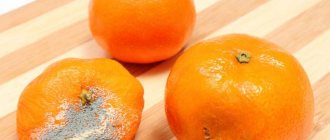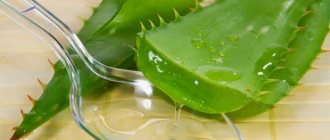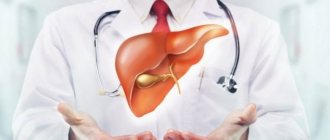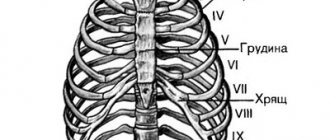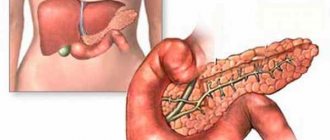What vitamins are contained in the liver?
The organ, which is a filter for the entire body, constantly contains B vitamins and ascorbic acid. These substances participate in biochemical processes and support liver function. In addition, the organ contains:
- Thiamine (B1) - participates in protein and fat synthesis, carbohydrate metabolism. A lack of thiamine leads to a lack of hepatocytes.
- Riboflavin (B2) - strengthens the walls of capillaries and has a beneficial effect on all organs.
- Niacin (B3) - takes part in energy metabolism, helps protect hepatocytes from destruction.
- Choline - cleanses the body, in particular the liver, of toxic substances. Regulates lipid concentration. With a lack of choline, cholesterol in the blood increases, fat molecules settle on the walls of blood vessels.
- Pyridoxine (B6) - starts the process of synthesis of the liver enzyme transminase. Participates in fat and protein metabolism, promotes the active processing of amino acids, and regulates the functioning of the digestive system.
- Cyanocobalamin (B12) - regulates the process of hematopoiesis.
- Vitamin C - stimulates the production of liver enzymes, takes part in carbohydrate metabolism and blood clotting, and the synthesis of steroid-type hormones. Ascorbic acid strengthens the walls of blood vessels and has a strengthening effect on the immune system.
These vitamins are important for the normal functioning of the organ. Their deficiency can lead to liver dysfunction and the development of many diseases.
Vitamins for liver and gallbladder restoration
In practice, the condition of hypovitaminosis has recently become widespread. It represents an insufficient level of vitamins in the body that are necessary for optimal liver function. The condition can act as a causative factor for liver disease (any).
So, if:
- lack of vitamin E, increases the likelihood of the formation of fatty degeneration, which also leads to disruption of the process associated with the processing of fats;
- there is not enough vitamin A, glycogen synthesis is affected, and bile secretion is noticeably different from the norm;
- the liver is sick, the absorption of elements A, E, D, C from the intestinal organ is difficult, which also leads to deficiency.
The liver needs substances C and E most of all. Groups B and PP are second in importance.
Vitamin C
It has the advantage that it contributes to a noticeable increase in the body's resistance to infectious processes. But it also allows you to achieve normal vascular permeability and has an antitoxic effect in case of intoxication.
If there is a deficiency of it in the body, this can lead to damage to metabolic processes, which adversely affects liver cells. Vegetable and fruit crops are an irreplaceable source of this substance.
Vitamin E
Another important substance that:
- maintains cellular structures in a stable and intact state;
- protects them from destruction and damage;
- slows down the aging process;
- ensures normal hormonal levels;
- entails strengthening immune function;
- normalizes metabolism.
The substance is found in large quantities in nuts, vegetable oil, and some berries. You can additionally use pills of synthetic origin; they can be purchased at pharmacy kiosks.
Lipoic acid
If you need to improve liver function, then you should take this vitamin compound. It is this that helps reduce the influence of poisons contained in the liver on the human body.
The substance is available in a large number of products. But if severe dysfunction is observed, doctors recommend taking special supplements.
Vitamin A
This substance is also extremely necessary, especially in the case of progression of hepatitis and cirrhosis. Indeed, in case of a deficiency of the substance, a person suffers from dry skin, brittle nails, and blurred vision.
If the disease progresses, food alone cannot cope; additional pharmaceutical medications are required. But under no circumstances should you set the dosage yourself.
It is best to consult your doctor and ask for professional advice. Most of the substance is found in cod liver and fish oil.
B vitamins
They are already contained in the human liver in large quantities and perform a huge number of functions:
- B12 is a substance that regulates hematopoiesis, prescribed in case of liver diseases and is essential; its high content is observed in products of animal origin (milk, eggs, meat, fish);
- B1, called thiamine, along with enzyme elements, takes part in the process of protein and fat synthesis, and if it is lacking, there is a possibility of failure at the hepatic-cellular level;
- B2 (riboflavin) leads to a noticeable improvement in the condition of blood capillaries, as well as in the functioning of the gastric and intestinal glands; in addition, it has a beneficial effect on the condition of the skin and mucous membranes;
- B3 is scientifically called niacin and takes an active part in cellular energy metabolism, helps delay the death of liver cells, increases the protective properties of the liver, is found in tomatoes, legumes, seeds, fruits;
- B6, pyridoxine - ensures the synthesis of an enzyme that is directly involved in the process of processing amino acids, leads to the complete absorption of fat and protein elements; with a deficiency, stomach upsets and disturbances in the secretion of bile begin to form;
- C (ascorbic acid), as already noted, also includes a large number of functions aimed, for example, at activating enzymes, participating in the coagulation of blood fluid, increasing vascular permeability, etc.
If you use all the given substances, the bile will be of high quality.
Vitamins and minerals beneficial for the liver
For the coordinated functioning of the organ, constant replenishment is necessary not only with vitamins, but also with other important elements. These include:
- Retinol (A) - participates in the deposition of glucose. Regulates the production of cholesterol, activates the regeneration of hepatocytes. The body should receive at least 0.7 mg per day.
- Tocopherol (E) - preserves the integrity of cell membranes, preventing their destruction under the influence of negative factors. This function is possible because tocopherol transforms free radicals into safer compounds. The norm per day is 25 mg.
- Philoquinone (K) - takes part in blood clotting, stimulates the regeneration of liver tissue. Requirement per day is from 0.1 to 0.3 mg.
- Inositol (B8) - accelerates lipid metabolism, promotes the active dissolution of excess cholesterol, regulates bile outflow, and has a strengthening effect on cell membranes. A sufficient amount of inositol prevents the development of cirrhosis. The norm is 1000-1500 mg.
- Lipoic acid (N) - participates in carbohydrate and lipid metabolism, saturates hepatocytes with useful elements, processes by-products of metabolic processes, making them safer. Alpha lipoic acid intake per day is recommended from 50 to 75 mg.
The liver also needs trace elements, particularly zinc, selenium, magnesium and copper.
Retinol for the liver.
Ascorbic acid - what the body needs it for
Ascorbic acid is a vitamin with a sour taste, known to everyone since childhood. But not everyone knows exactly how ascorbic acid affects the body. This acid also has its contraindications, and an overdose is fraught with unpleasant consequences. What is the daily intake of ascorbic acid? You will learn about this and much more below.
What is ascorbic acid
Ascorbic acid, or as it is also called, vitamin C, is an organic compound with the formula C6H8O6. The physical criteria are as follows: white powder of a crystallized nature, with a sour taste. Vitamin C easily dissolves in aqueous and alcoholic solutions.
If you delve into the history of ascorbic acid, its roots go back to 1928. It was invented only in its pure form, by the then famous scientist - chemist A. Szent-Gyorgyi. In 1932, he was able to explain to many why this acid is simply necessary for humanity.
Functions of ascorbic acid in the human body
The function of ascorbic acid is antioxidant. With its help, the activity of free radicals is suppressed. This leads to proper control of oxidative and reduction reactions in the body. As a result, with the help of ascorbic acid, the walls of the body’s cells are protected from various types of damage.
The benefits of vitamin C for each body system:
— stimulation of the immune system;
— preventive effect on diseases of an infectious nature, as well as assistance in the fight against an existing infection in the body;
- Helps counteract allergic and inflammatory reactions.
- The cardiovascular system
— destruction of toxins contained in the blood;
- the process of hemoglobin formation increases;
- “unnecessary” cholesterol is eliminated, but “needed” remains;
- blood clotting is significantly improved.
- Gastrointestinal tract performance system
— the process of absorption of iron from the small part of the intestine improves;
— normalization of the process of bile formation;
— the toxic effect of the liver on the body is minimized.
- takes an active part in the connection of hormones;
- excretory activity of the pancreas shows its activity;
- Thyroid performance is improved by taking vitamin C in any form.
Daily norm of Ascorbic acid
On average, to fully satisfy the body with ascorbic acid, you need from 0.06 g to 100 mg. per day. But, if we take into account the fact that many people play sports and lead an active lifestyle, then in such cases the dose calculated per day should be increased. On average up to 150 - 180 mg. per day.
For preventive use of ascorbic acid, an adult needs to consume from 60 to 120 mg. per day. Children - 1 tablet, which contains 50 mg of vitamin C.
If we are talking about taking Ascorbic acid for medicinal purposes for adults - 2 tablets, but the intake will be 3-4 times a day.
Therapeutic dose of Ascorbic acid for children:
- from 3 to 7 years - 2-4 tablets per day;
- from 7 to 10 years - 4 tablets per day;
- from 10 to 14 years - 4-6 tablets per day.
Ascorbic acid is taken only after meals , then it is quickly absorbed into the blood and begins its active activity.
If a child is found to have a deficiency of this vitamin in his body, he will need to be given 1-2 tablets twice a day.
For details on how much vitamin C is needed per day for different categories of the population and who needs ascorbic acid most, read the article Daily Vitamin C Allowance for Humans.
Who should use Ascorbic acid?
What is vitamin C for? Who needs it:
- The main criterion for people who need ascorbic acid is those who have been poisoned by any gas. Thanks to Ascorbic acid, the reduction processes that cause oxidation are normalized;
- During the off-season, every person needs to monitor their health, and first of all, their immunity. Therefore, ascorbic acid is the best assistant for vitamin deficiency. It can be consumed in medicinal form, and there is also a large list of fruits and vegetables containing vitamin C;
- Women during pregnancy simply need vitamin C. Pregnant women often do not have enough of it, and in order to receive a normal dose for fetal development, the expectant mother must consume it in any form, but already 25-30% more than the usual norm.
- Smokers also need Ascorbic acid. Consuming at least small amounts every day will help the smoker restore the acidic environment in his body.
If you take vitamin C for a long time in greater quantities than required, and then abruptly stop taking it, the amount of this vitamin will be significantly less than it was before you started taking it.
These consequences are associated only with the fact that if there is excess vitamin C in the body, a complete disruption of glucose absorption occurs. This threatens the appearance of the first signs of diabetes. There is also a risk of stones forming in the kidneys and bladder.
As for children, an excess often leads to the destruction of tooth bone and enamel.
Therefore, there is no need to self-medicate and prescribe Ascorbic acid without first visiting a doctor. Like any drug, ascorbic acid can bring both benefits and harm.
Contraindications
The list of contraindications for taking Ascorbic acid is not long, but you should not neglect them:
- Thrombophlebitis;
- Diabetes;
- Glucose-galactose malabsorption.
Before starting to take ascorbic acid, people suffering from renal and liver failure, leukemia, anemia, developing cancer, hemochromatosis, should definitely consult with their doctor.
Excess and deficiency of ascorbic acid
Excess vitamin C is dangerous for humans and causes a lot of unpleasant symptoms. In addition, an overdose leads to an increase in the concentration of salts in the body, and this complicates the functioning of the kidneys.
The following symptoms of excess vitamin C are identified:
- Dizziness.
- Gas formation.
- Stomach ache.
- Body itching.
- Rash.
- Insomnia.
Vitamin C deficiency
- bruises on the body;
- constant bleeding gums;
- increased nervous excitement;
- frequent infectious diseases;
- the skin is flaky and irritated, the hair loses its shine and breaks.
Ascorbic acid and glucose
Now in pharmacies you can find ascorbic acid with glucose in tablets. The features of this drug are as follows:
- when taking ascorbic acid and glucose together, liver function improves;
- Glucose provides rapid energy supply to the body.
Let's look at the functions that ascorbic acid performs with glucose in our body:
- Metabolic action;
- Improves oxidative and reduction activity;
- Carbohydrate metabolism improves;
- Blood clotting returns to normal;
- Regeneration of body tissues is normalized;
- The drug takes part in the combination of hormones - steroids;
- Significantly increases immunity.
Vitamin C combined with glucose is easily absorbed, so this drug can be taken by children over 5 years of age.
Indications for the use of ascorbic acid with glucose
- overwork, irritability;
- increased permeability of blood vessels;
- chronic periodontitis, bleeding gums;
- people exposed to frequent infectious diseases;
- food poisoning.
You can read the instructions for using ascorbic acid with glucose in the article Ascorbic acid with glucose - how to take it and what it is prescribed for.
Ascorbic acid helps cope well with viruses and has a beneficial effect on the normal functioning of the body. But before taking it, it is better to consult a specialist, as there are a number of contraindications.
Source: https://witamin.ru/vitaminy/vitamin-c/askorbinka.html
Indications for use
Vitamin complexes are recommended for use in case of diseases of the organ, the presence of a symptomatic picture indicating liver dysfunction. The following signs indicate that pathological processes have begun to occur in the main filter and it is not doing its job:
- change in urine color (darkening);
- formation of dark circles under the eyes;
- a feeling of heaviness and pain in the right side under the ribs;
- the formation of dark spots on the skin, the appearance of numerous pimples and skin irritation;
- change in skin color, acquiring a yellow tint;
- psycho-emotional disorders: irritation and apathy, depression, constant feeling of drowsiness, despondency;
- prolonged headaches;
- belching that occurs every time after eating, leaving behind an unpleasant taste in the mouth;
- attacks of nausea;
- bitterness in the mouth;
- lack of appetite.
The appearance of these signs is an indication to immediately consult a doctor. You cannot take any medications or vitamins on your own. First an accurate diagnosis must be made. Only after this will the doctor prescribe vitamin and mineral complexes necessary to restore the structure of the organ and its functioning.
Three rare vitamins that save the liver and reduce cravings for alcohol

A vitamin has been found that reduces cravings for alcohol.
Photo: GLOBAL LOOK PRESS
We think we know everything about vitamins, or at least a lot. There are popular star vitamins. Everyone, even if you wake up in the middle of the night, will say that ascorbic acid improves immunity and helps cope with colds, and vitamin D and calcium strengthen bones. And there are vitamins - “soldiers of the invisible front”. They seem to be in the shadows, but at the same time they are no less important for the body than their highly promoted “colleagues”. We decided to eliminate injustice. So, welcome!
INOSITOL or vitamin B8 protects the liver from a wide variety of harmful effects - from alcohol to the effects of taking medications. Inositol also prevents the liver from becoming overgrown with fat, that is, it reduces the risk of fatty hepatosis.
The best sources of vitamin B8 are peanut butter, grapefruit, lime, and melon.
PANGAMIC ACID or vitamin B15 is a powerful antioxidant and “cleaner” of toxins from the body. Increases physical endurance, improves metabolism and even reduces cravings for alcohol! It is also known that pangamic acid increases the lifespan of body cells and prevents their degeneration into malignant ones.
The best sources of vitamin B15 are brown rice, bran, sesame seeds, pumpkin, and beef liver.
But a vitamin under the complex name PABA (para-aminobenzoic acid) or otherwise vitamin B10 protects the lungs from the harmful effects of ozone, and the skin from excessive ultraviolet radiation (by the way, PABA is often included in sunscreens). This vitamin has another useful property - it reduces the impact of tobacco smoke and tar from passive smoking. And in general it is an adaptogen, that is, it helps our body adapt to negative natural weather changes.
The best sources of vitamin B10 are offal, beef, lamb, mushrooms, spinach, and brewer's yeast.
FACT
The first vitamin discovered was thiamine.
Doctors thought a long time ago, even before our era, that food products contain some substances that greatly help the body in various difficult situations, but they could not clearly formulate it.
The fact that citrus fruits were used to treat scurvy (an acute deficiency of vitamin C, which causes gums to become inflamed and teeth to fall out) was discovered by the ship's doctor, the Scotsman James Lind, in 1747, and in his treatise he recommended that you be sure to take more lemons and oranges on board if you had to go on a long journey. swimming.
And in 1911, the Polish biochemist Casimir Funk, scientifically - using chemical analysis - isolated a certain crystalline compound from rice bran and called it vitamin B1 or thiamine, which prevented the dangerous beri-beri disease. In 1912, Dr. Funk called this substance “vitamin” or “vital amine” (from Latin - “vita” - life, “amini” - amines, nitrogenous compounds).
BY THE WAY
Excess iodine is dangerous for the thyroid gland, and calcium is dangerous for the heart!
How to choose vitamins without harm to health, expert advice. Having dropped into the most ordinary pharmacy, I counted on the counter more than 20 complexes with calcium, iodine, fluorine and loading doses of ascorbic acid. And they all “boost immunity”, “prolong youth” and “fight stress and flu”. As they say, no problem - buy and drink. And it is necessary?
Natalya Opykhtina, drug expert, pharmacologist:
— You can’t take multivitamins all the time. After all, if water-soluble ones (group B, vitamin C, K, folic acid Bc) are removed from the body, then fat-soluble ones, such as vitamin A or D, can accumulate. And their overdose can lead to unpleasant consequences. A severe excess of vitamin A (its daily value is 1.5-2 mg) in a pregnant woman can cause developmental disorders in the unborn baby. In addition, a constant overdose of this vitamin is fraught with disturbances in the liver, headaches with nausea and vomiting, and joint pain.
With an excess of vitamin E, there are rarely any side effects. It can still cause bleeding in those taking medications that reduce blood clotting (including aspirin).
Preparations with iodine should generally be prescribed only when indicated. Although Moscow belongs to the moderately iodine-deficient regions, you first need to find out whether you personally have a deficiency of this element. After all, its excess can seriously hit the thyroid gland and provoke hyperthyroidism.
As for ordinary multivitamin complexes, it makes sense to take a monthly course of them twice a year - in late autumn and early spring. This will help boost the body's defenses.
We get almost all the essential vitamins from foods. But during storage their content decreases. For example, in apples within 2-3 months the content of vitamin C decreases by about 30-40%, in frozen berries it disappears by half, and when cooking jam, ascorbic acid is destroyed by 75-80%.
But when choosing a complex, make sure that the amount of ascorbic acid there does not exceed 1.5 grams per day. Of course, vitamin C is easily excreted from the body, but if you overdo it, you may experience a skin reaction like hives.
IMPORTANT
The wonderful and terrible vitamin D
An overdose of it can damage the kidneys, and a lack of it can destroy teeth...
This is one of the most important vitamins for health, especially in the fall. After all, in our body it is synthesized only when exposed to sunlight. And with the short daylight hours, it was a big stress for all northerners, including us. Without this vitamin, calcium cannot be absorbed, bones become brittle, hair and nails become brittle, and teeth crumble.
And here’s the problem - the food from which it is absorbed is very specific - cod liver, mackerel - you don’t eat it every day. Chicken yolks also contain it, but very little. Therefore, it is good if multivitamins include it. But only within reasonable limits, says pharmacologist Natalya Opykhtina:
— Currently, the norm of vitamin intake is 300-400 IU (7.5-10 mcg) per day for children of all ages and adults under 50 years old; at older ages it increases to 800 IU (18-20 mg) per day.
And if you regularly exceed the daily requirement of vitamin D several times, the amount of calcium in the body tissues will greatly increase, and this will lead to kidney disease and cardiac conduction disturbances. Also, with an excess of vitamin D, blood pressure rises, loss of appetite, weakness and nausea are observed.
BY THE WAY
Are artificial vitamins worse than natural ones?
We talk to experts about how much and what to take for the health of the body (details)
Vitamin complexes
Not all vitamin preparations will be equally beneficial for the liver. To choose the right product, you should undergo a series of tests to determine which substances are missing. Therefore, only a doctor should choose the complex.
The drug Vitrum
It is considered one of the best for the liver, because. has a balanced composition. It contains essential vitamins that are essential for the liver: C and E, A, D3, B.
Vitrum can be taken not only during the treatment of pathologies, but also as a prophylaxis to protect the liver in the presence of provoking factors. Vitrum is recommended for viral and infectious diseases, during chemotherapy, and during long-term use of antibacterial drugs.
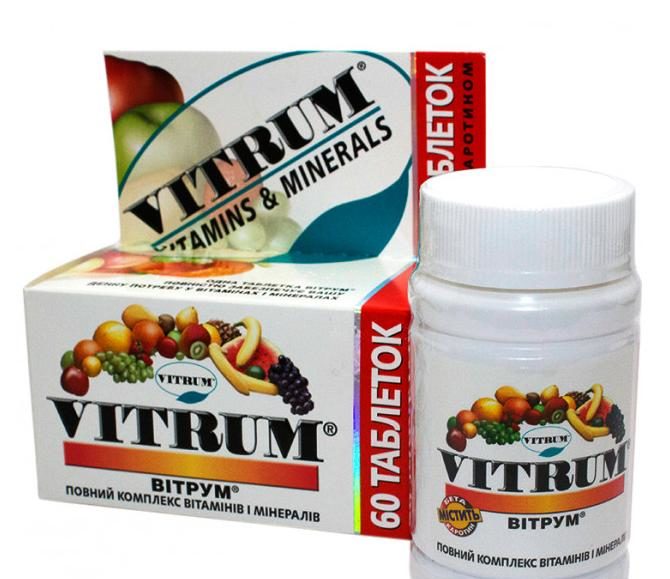
The drug Vitrum.
The product has a wide spectrum of action: it establishes and improves liver function, promotes the production of sufficient amounts of insulin, and has a beneficial effect on the functioning of all internal organs.
Gepatrin Evalar
The complex is used for cirrhosis and hepatitis, as well as other liver diseases. The composition includes vitamins B6, B2 and B1, E, artichoke and milk thistle extracts, lecithin.
It is recommended to take the dietary supplement before meals so that it works better and faster. Hepatrin normalizes the processes of production and outflow of bile, improves organ functions, and promotes the active elimination of toxic substances.
Gepagard Active
The drug belongs to the group of hepatoprotectors. Composition: tocopheryl acetate, carnitine and phospholipids. Indications for use: liver intoxication, high cholesterol concentration, obesity.
One of the active components of the drug is L-carnitine, which improves the processes of carbohydrate and lipid metabolism and prevents fatty degeneration of liver cells. The complex is prescribed during the treatment of fatty liver, hepatitis and a number of other pathologies, as well as for prevention.
The drug Riboflavin
Riboflavin has a beneficial effect on liver tissue and strengthens capillary walls. With a lack of this vitamin, the liver cannot cope with bile acids. An increased concentration of acids can cause organ dysfunction.
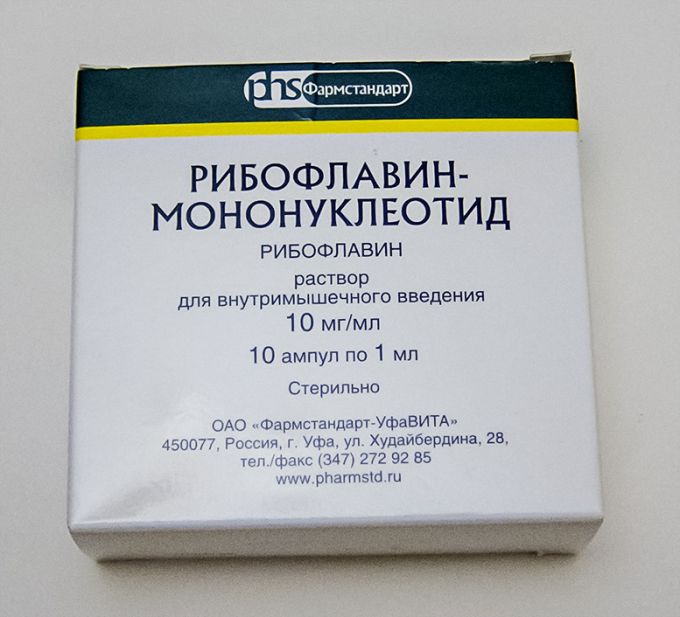
Riboflavin.
Healthy food
The condition of the organ depends on the diet, so it is worth following a number of general rules.
- Limit fats that lead to the formation of cholesterol.
- Minimize the amount of sugar consumed.
- Consume vegetable oil to improve the condition of body fluids - blood, lymph, bile.
- Eat legumes, nuts, and cereals.
- Limit consumption of coffee and caffeinated drinks.
- Do not abuse diets, fasting days, fasting, which imply a lack of balance in nutrition.
- Do not practice “therapeutic fasting”.
Magnesium diet
In addition, patients are offered a magnesium diet, which involves including in large quantities the following elements in the diet:
- vegetable fiber;
- vitamin substances;
- magnesium salts.
All these components have a powerful anti-inflammatory effect, reduce gastrointestinal tract, and lead to increased intestinal motility. The amount of magnesium in this diet is approximately 4 times higher than the same amount in the classic diet.
The diet includes foods that contain magnesium. It is necessary to exclude table salt. This style of nutrition is prescribed in the form of sequential diets, and each of them contains about 0.8-1.2 g of magnesium.
Pharmaceuticals for the liver and gallbladder
Important! If you decide to supplement your diet with pharmaceutical products, consult your doctor first.
- Glycyrrhizic acid . This is the active element of licorice root, which has been used in medical practice for over 3 thousand years. Tests have proven that the product protects the liver from damaging substances and has powerful anti-inflammatory and antioxidant properties.
- Ursodeoxycholic acid . It is an excellent liver protector used for the treatment and prevention of diseases. The product is not used for gallstones.
- Ademetionine . It is a derivative of an amino acid called methionine. It improves the condition of the liver in the presence of toxic lesions and is used as part of complex therapy for various lesions. It is strictly forbidden to take it in an “interesting situation”, GV.
- Thioctic acid . It is present in a large number of drugs intended for the treatment of liver diseases and gallbladder pathologies. Relieves hepatitis, poisoning, cirrhosis. Not for use by children or those with hypersensitivity to the components.
Thus, the list of substances useful for the gallbladder and liver organ is wide and varied.
Dish recipes
If we consider the approximate menu of a person who wants to keep the liver and gallbladder in a normal state, several nutritional options can be taken into account.
Way of proper nutrition No. 1
Breakfast: oatmeal with a piece of wholemeal bread, 1 boiled egg, berry jelly.
Second meal: 1 apple or a couple of bananas.
Lunch: vegetable soup (carrots, potatoes, broccoli, onions), a side dish (peas, beans, lentils) and a piece of boiled poultry, fresh berry compote.
Dinner: steamed vegetables.
Precautionary measures
Although most people think vitamins are safe, they can be harmful if taken incorrectly. It is strictly forbidden to use complexes in excess of the daily amount of tablets or capsules. This will not speed up liver recovery, but will provoke an overdose.
The following symptoms indicate hypervitaminosis:
- insomnia;
- frequent and prolonged headaches;
- psycho-emotional overexcitation;
- weakness and drowsiness;
- lack of appetite;
- suppression of the immune system.
An overdose of vitamins can lead to the formation of kidney stones. The manifestation of these symptoms is an indication to discontinue medications and seek medical help.
Water-soluble vitamins, entering the body in excess quantities, are excreted through the kidneys with urine. Excessive amounts of fat-soluble elements lead to their accumulation in soft tissues. To remove excess from the body, long and difficult treatment may be required.
Healthy foods containing vitamins for the liver
In order for the liver to receive a sufficient amount of useful and nutrients, you need not only to take vitamin complex products. Sources of vitamins can be:
- Sea cabbage. Beneficial for the whole body. It contains high concentrations of iodine, zinc and selenium. This product is the basis of dietary nutrition; it cleanses the liver, helping to remove toxic substances from it.
- Pumpkin. Contains retinol, carnitine, tocopherol, ascorbic acid. Useful components help neutralize fats. Carnitine helps to better process heavy foods, due to which the organ is unloaded.
- Dairy and fermented milk products. Cottage cheese, kefir, sour cream and other products contain a high concentration of calcium, vitamins and amino acids. All components are extremely important for maintaining the smooth functioning of the liver and its condition. To prevent organ diseases, fermented milk products should be present in the diet every day.
- Vegetables. Contains retinol, ascorbic acid, B vitamins. Onions, carrots and beets are the best vegetables for the liver. They saturate tissues with useful elements, help cleanse and increase local immunity.
- Dried apricots. Reduces the amount of bad cholesterol, due to which the liver is unloaded and its function is restored.
- Olive oil. Powerful natural antioxidant. Regular consumption helps protect the liver from the damaging effects of harmful factors: poor quality, heavy food, cigarette smoke, ultraviolet radiation and chemical and radioactive substances.
What are antivitamins
Not all vitamins are necessary or beneficial for the liver. Antivitamins are substances that have a negative effect on the body by destroying beneficial substances. Antivitamins include:
- Ascorbate oxidase. Present in fruits and vegetables. Promotes the oxidation of vitamin C during long-term storage.
- Thiaminase. Destroys vitamin B1. Contained in coffee, so it should not be abused. The antivitamin accumulates with excessive consumption of eggs and raw fish. Present in blueberries, currants and cherries. These products should not be eaten in large quantities, nor should they be stored for long periods of time. This will make their beneficial composition poorer, and the antivitamin content will increase.
To prevent the liver from being attacked by antivitamins, you need to properly prepare your diet. The menu should be balanced, without excessive predominance of one product. In addition, antivitamins are destroyed during heat treatment.
Common misconceptions about the liver
There are a number of myths associated with liver and vitamins. You need to figure out which of them are true and which are not:
- Quitting alcohol will help cleanse the liver and prevent the development of pathological processes in it, which means there is no need for vitamins. This is not entirely true. Alcohol negatively affects the condition of the organ, but is not the only destructive product. Abuse of fatty and heavy foods, fast food, snacks, cigarette smoke, taking medications - all this gradually poisons the organ, so it needs periodic cleaning and vitamins.
- Hepatoprotectors are taken only if appropriate symptoms are present. Not true. If signs begin to appear, it means that the pathological process is already actively developing and requires treatment.
- Herbal supplements will help completely cure the liver. Wrong. They cannot be used as drug therapy and are only an addition to it. Herbal supplements and vitamin complexes can be used for preventive purposes.
- The organ needs regular cleaning. Wrong. If there are no problems with the condition and functioning of the organ, it will itself be cleansed of harmful substances entering it. Taking hepatoprotectors unnecessarily and carrying out cleansing manipulations (probing, tubing) can only harm the liver. In addition, it will lead to active leaching of vitamins, macro- and microelements from the body.
Vitamins are necessary to maintain good condition and smooth functioning of the liver. The main rule for the correct intake of vitamin complexes is strict adherence to the recommended dosages. Otherwise, it may lead to an overdose.
To avoid liver problems, you should follow a proper diet and give up bad habits. It is prohibited to take hepatoprotectors and vitamin complexes on your own without indications.
source
general information
To know how to alleviate your own fate and not turn life into complete torture, you need to pay special attention to risk factors. Normally, bile fluid is called upon to solve a huge number of problems.
Yes, she:
- participates in the processing of fats;
- helps digest proteins;
- helps neutralize enzymes;
- increases the secretion of gastric juice;
- stimulates the movement of a bolus of food through the intestines;
- provides the removal of some toxins.
If metabolic reactions are normal and not aggravated by anything, there are no lumps in the bile, since it is completely liquid.
However, when unfavorable factors confluence, a change in proportions occurs, and the liquid acquires a lithogenic character, with a tendency to form sediments and stones.
Why do problems with the liver and gallbladder occur?
Among the risk factors that provoke the occurrence of this condition, the following areas can be distinguished.
- Inflammatory processes in the gallbladder provoke the disease in the first place. Swelling of the walls of the bladder occurs, which entails an outflow of bile fluid. This fact acts as the reason for the formation of stones. This phenomenon can also be observed from birth.
- Obesity. Cholesterol plaques settle on the vascular walls and organs, interfering with their normal functioning. This leads to disruption of the functioning of the liver and gallbladder.
- Deficiency of certain vitamin substances. In particular, this is due to vit. groups A, C.
- Congenital anemia, which is accompanied by a noticeable increase in bilirubin content, and this, in turn, is fraught with the formation of corresponding stones.
- Hereditary influence. Individual characteristics of the bile composition, transmitted “inheritedly,” can also provoke the formation of cholelithiasis.
- Physical inactivity. This phenomenon leads to a noticeable disruption of metabolic reactions, provokes the formation of excess weight and bile stagnation. All this adds up to increase cholesterol levels and cause stones to appear.
- "Interesting situation." In this condition, serious hormonal changes occur in a woman's body. And the processes observed in the 3rd trimester often entail a violation of bile outflow.
- Severe stressful situations. They can be acute or chronic. Traditionally, the conditions provoke muscle spasms and create obstacles to the complete outflow of fluid.
To neutralize the influence of these factors and maintain a normal life, a person needs to receive a sufficient amount of vitamin substances.
They come with food, various supplements and pills. Vitamins are not drugs, not stimulants, and not meal replacements at all.
These are unique organic elements that are acutely and extremely necessary for maintaining life, as well as for growth, development and well-being.
With the exception of a number of rare cases, these substances are not synthesized by our body. They are simply formed from food and are usually found in them in large quantities.
Remember that vitamins used for the gallbladder and liver will in no case cure the disease, since these are only elements of special supportive therapy. But if they are deficient in health, serious problems can arise.
What vitamins are needed for the liver - a list of useful drugs from the pharmacy
Vitamins for the liver are a group of drugs that help ensure the normal functioning of the organ. Low-molecular substances are necessary for liver function, as they accelerate the process of regeneration of damaged tissue, help the body quickly cope with radicals and normalize the functioning of the gallbladder.
Vitamins for the liver are used along with other drugs in the therapeutic program. If necessary, doctors prescribe therapy at least 1–2 times a year.
What vitamins are needed after gallbladder removal?
Vitamins, in simple terms, are small food particles that work for human health through an enzymatic system.
If they are in the body in insufficient quantities, this is fraught with enzyme deficiency, which ultimately affects the overall performance of the body.
That is, vitamins belong to a unique group of low-molecular substances with a simple structure. They are united by the fact that our body urgently needs them as an integral part of food.
The human liver is an organ with a huge number of functions. One of its most important tasks is the secretion of bile fluid, which is stored in the gallbladder and enters the intestine when needed.
This substance is required for the digestion of food particles, absorption of vitamin elements of groups A, E, K, D, as well as the absorption of calcium, enhancing intestinal motility. All this prevents the formation of constipation and health problems.
The gallbladder is a special reservoir for the accumulation of bile obtained from the liver. Bile fluid consists of the following groups of elements:
- lecithin;
- cholesterol;
- bile acids and their salts;
- other substances.
What substances are required first?
In order for the functions of the digestive tract to remain relevant, it is necessary to use active compounds that have become part of modern dietary supplements and vitamin complexes. But most of the necessary substances are found in classic foods.
- Fatty acid . These are integral components of any living cellular structure. Such substances are used to prevent the formation of cholelithiasis. They are present in a large number of food products and can be easily obtained without the use of specialized pharmaceutical complexes.
- Lecithin . It acts as an active emulsifier of fats and ensures their rapid digestion process. The substance is contained in bile, and for the gallbladder to work properly, it must enter it from the outside.
- L-glycine . This element is required for the synthesis of bile acids. At the same time, small dosages of vitamins belonging to groups B6 and C are used, respectively.
- Substances-representatives gr. B. _ They are clearly required to ensure the normal digestion process. In addition to the main diet, doctors sometimes recommend consuming B12 and choline. They act as the most important participants in cholesterol metabolism, liver functioning, and gallbladder.
- Vitamin C. If there is a deficiency of it in the human body, this can increase the likelihood of stone formation in the gallbladder.
- Vitamin D. If gallbladder function is initially impaired, this may lead to changes in vitamin D absorption and worsening of the clinical picture.
The nature of a person’s nutrition plays a colossal role in the process of maintaining the function of the gallbladder normally. After all, obesity has a direct and immediate relationship with disorders of the gallbladder and liver.
B vitamins
After the patient contacts, the doctor will check the condition of the liver, for which he will prescribe a set of diagnostic procedures. Based on its results, one can judge the health of the liver, as well as the need to take multivitamin preparations.
A liver vitamin is a specific chemical compound necessary to normalize the functioning of the entire organ. The organ contains various vitamins, the deficiency of which leads to pathological dangerous processes.
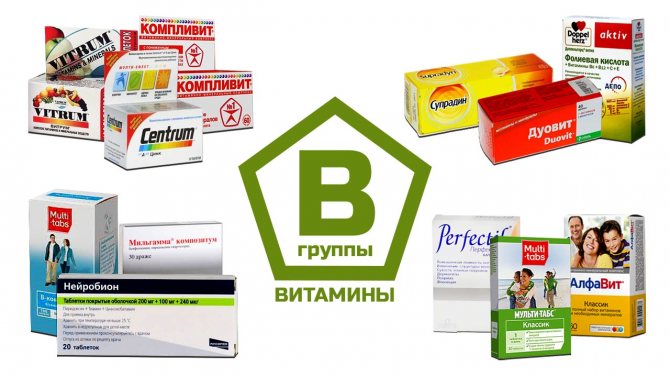
When explaining which vitamins are good for the liver, the specialist will definitely mention the following:
- B1 is a component without which normal synthesis of fats and proteins would be impossible; thiamine also takes an active part in the breakdown of carbohydrates. If there is not enough thiamine in the body, it will lead to hepatocyte deficiency.
- B2 - components that are necessary for the normal functioning of the organ, but not only. The normal functioning of the intestines, stomach, and esophagus also depends on the amount of riboflavin entering the body, since the component has a beneficial effect on the capillary network and has a stimulating effect. If there is not enough riboflavin, the body cannot cope with the normalization of bile acid synthesis.
- B3 is an important component that is responsible for energy metabolism in the body. If there is a lack of nicotinic acid, metabolic processes in the body slow down, and there is no component that could prevent the destruction of hepatocytes.
The body also needs other types of vitamins. He will need choline. This is vitamin B4, which activates liver function, and with deficiency, lipid levels increase. This is due to the fact that fat molecules cannot be fully processed by the organ, which leads to the accumulation of harmful cholesterol in the blood and clogging of blood vessels.
Hepatologists warn that the liver is a unique organ; it does not have nerve endings, and therefore the disease is difficult to detect. In 83% of cases, such untimeliness causes death. That is why you should undergo examination at least once every year or two.
- B6 – ensures the synthesis of the liver enzyme – transaminase. This is an important component, without which the process of breaking down fats and proteins will slow down. Dysfunction leads to the fact that over time the process of bile separation is inhibited, which leads to disruption of the entire digestion. Pyridoxine is necessary for the body to nourish the liver tissue and ensure the maintenance of normal microflora.
- B12 – is responsible for the process of normal hematopoiesis. It is this vitamin that is necessary for the liver and for the whole body, since it is directly involved in the process of creating hemoglobin. With a lack of cyanocobalamin, organ dysfunction is observed.

All these substances must be supplied to the body with food every day. With an unbalanced diet and constant starvation diets, a deficiency of B vitamins may occur.
How does vitamin C affect the liver?
The liver is a vital organ. Vitamins for the liver are needed to nourish it in order to maintain normal functioning. The greatest influence is exerted by vitamins C and E. As you know, the elements are found in food products. Therefore, it is important to know which foods to pay attention to and which ones should be excluded from the diet.
Normal liver function requires the body to receive certain vitamins and minerals in the right quantities.
Important information about nutrients for the body
The liver occupies an important position in digestion, helps process fats, influences intestinal motility, blocks and destroys microbes, and removes toxins.
The liver regulates glucose levels, as well as the metabolism of nutrients and minerals. But with diseases of the liver and gallbladder, disturbances in the absorption of vitamins and minerals from the intestines are observed.
In this case, it is difficult for the gland to recover on its own. Advantageous elements:
- B vitamins (B1, B3, B4, B6, B12);
- vitamins A, C and E;
- lipoic acid.
Useful elements
The liver vitamin is characterized by high biological activity and is needed by the body in a certain amount. The daily requirement depends on the gender and age of the patient.
The need for them increases: during pregnancy and lactation in women, intense physical activity in athletes and intensive growth in children. Increased consumption of micro- and macroelements is observed in diseases of the liver and kidneys.
The body does not store vitamins and minerals, so they must be supplied daily in the required quantities. Each element has its own special purpose for the liver and the body as a whole.
Ascorbic acid
Vitamin C or ascorbic acid is responsible for the process of blood clotting and is involved in the metabolism of carbohydrates. Acting as an antioxidant, it completely blocks toxins. Resistance to diseases is increasing.
But with a lack of vitamin, the cells in the liver become more vulnerable to a variety of diseases. If there is an increased need, the doctor may additionally prescribe vitamin preparations due to an increase in dosage; they can be purchased at the pharmacy. So it is important to ensure that the macronutrient is supplied in sufficient quantities.
The daily norm is from 50 to 100 mg. The foods richest in ascorbic acid are:
- black currant;
- rose hip;
- raspberries;
- cabbage;
- citrus.
Tocopherol
Vitamin E or tocopherol acts as an antioxidant and protector against environmental influences. The stability of red blood cells and endocrine glands increases, cell aging slows down. Tocopherol deficiency leads to a decrease in magnesium in tissues and cell aging, which, in turn, causes cancer.
The first cause of deficiency is self-directed diets. Liver pathology and cholelithiasis also limit the access of the element in the required quantity. The norm per day is 15 mg. Rich in the element: cereals and legumes, broccoli, rose hips and rowan, cherries and sea buckthorn, peanuts and almonds, eggs.
B vitamins affect protein synthesis, bile flow, removal of toxins from the body, and hematopoiesis, which is directly related to the liver.
Properties of B vitamins
- Thiamine (B1). Participates with enzymes in the synthesis of proteins, fats and carbohydrate metabolism. An insufficient amount of the element causes hepatic cell failure. The daily requirement of the body is from 2 to 2.5 mg. Contained in nuts, rye bread, green peas, eggs.
- Riboflavin (B2).
Improves the condition of capillaries and skin, the functioning of the intestinal and stomach glands, liver, and mucous membranes. Its deficiency reduces bile synthesis and impairs its outflow. The daily norm is 2 - 3 mg. More is found in almonds, parsley, cheese and cottage cheese, beets, yeast, peaches, and soy. - Niacin (B3 or PP).
It is related to energy metabolism, fights the death of gland cells, enhances the protective function, and eliminates liver cirrhosis. Requirement per day is 15 mg. It is worth consuming foods such as turkey and lamb, peanuts, yeast, cereals, green tea, and bran. - Choline (B4).
Takes part in neutralizing toxins and stimulating intestinal function. With a deficiency, there is an accumulation of fats in the liver. The daily requirement is not less than 0.5 g. The largest amount of the element is in egg yolks, oatmeal, barley, and caviar. - Pyridoxine (B6).
Participates in the synthesis and processing of amino acids. There is a stimulus for the body to absorb proteins and fats. A defective element causes disruption of bile secretion. You only need 2 mg per day. Sources of the vitamin are bananas, chicken, nuts. - Cyanocobalamin (vitamin B12).
Involved in the process of hematopoiesis. The element is vital for the functioning of the liver, as it is part of it. Requirement per day is 0.005 mg. Contained in kefir and cheese, fish and shellfish, and rabbit meat.
Lipoic acid is a vitamin essential for fat metabolism and the removal of toxins from the body by the liver.
Lipoic acid or vitamin N
Lipoic (thioctic) acid is very important in normalizing the balance of fats and carbohydrates and affects the removal of toxins and waste. The daily dose varies from 0.5 to 30 mg.
For hepatitis, additional vitamin intake is prescribed; the name of the drugs should be checked with the attending physician.
Thioctic acid is included in many products: beef, offal, greens, buckwheat, rice, flax, wheat, beans, mushrooms, potatoes.
Other elements
But the liver also needs other useful elements. With hepatitis and cirrhosis, the need for vitamin A (retinol) increases. Brittle nails and dry skin are observed. Abuse causes severe stress and disruption of functioning. The recommended dose of retinol is 1 mg per day. Contained in fish oil, cod liver and animal, dairy products.
What minerals are vital?
Minerals are divided into microelements and macroelements. Macroelements help regulate water-salt balance and affect the process of hematopoiesis and its clotting. Copper, manganese, iron, calcium are the basis of this process.
Minerals are also found in many enzymes, hormones and vitamins. Therefore, the mineral is especially important during pregnancy. Typically, mineral deficiency occurs due to the monotony of the menu. It turns out that the body has something in excess, but does not receive something at all.
As a result, the normal functioning of the body is disrupted.
Important microelements
Magnesium, potassium, and sodium have an alkaline effect on the body. Additional use is prescribed for liver diseases and poor circulation. Selenium and zinc are very important microelements for liver function.
Their deficiency causes destruction of liver cells, resulting in various diseases. Selenium is the most important trace element for the liver. Since it fights the toxic effects of medications and alcohol. You need from 30 to 100 mg per day.
Garlic, pistachios, pork and seafood are the main sources of the element.
Complexes of vitamins and minerals for the liver
Vitamins for liver disease are needed in increased composition. At such moments, even proper nutrition will not bring the desired result. Therefore, experts strongly recommend taking complex preparations of minerals for the liver from time to time for preventive and therapeutic purposes. Such drugs are: “Ascorutin”, “Vitrum”, “Complivit”, “Berlition”, “Lecithin”, “Provitam”.
Hundreds of suppliers bring hepatitis C medications from India to Russia, but only M-Pharma will help you buy sofosbuvir and daclatasvir, and professional hepatologists will answer any of your questions throughout the entire treatment.
Source: https://gepasoft.ru/kak-vitamin-s-vlijaet-na-pechen/
Other vitamins
You can find out which vitamins are needed for liver health online or from your doctor. In addition to the indicated and very important vitamin B group, the following components are needed:
- Ascorbic acid. This is a well-known vitamin C. It is necessary for strengthening blood vessels - responsible for restoring elasticity. Vitamin C ensures the restoration of the body's protective functions, which are required to activate protection against viruses and bacteria and the synthesis of steroid hormones. Ascorbic acid is often prescribed by doctors in the complex treatment of the liver; it allows you to recover from colds, as well as long-term illnesses. To urgently restore the functions of the organ, vitamin C for the liver will be prescribed in increased dosages, but this can be done according to indications by the attending physician.
What are antivitamins for the liver?
There are vitamins that are beneficial for the liver. However, there are also components that are capable of destroying and destroying chemical compounds, which are vitamins. They are called antivitamins in the medical community. Components dangerous to the organ and the whole organism include the following:
- Ascorbaxylase. This component is found in juices and vegetables; it destroys ascorbic acid, which is necessary for the liver. Vitamin C is destroyed outside the body, but when eating depleted food, a person does not receive enough valuable substances. To avoid causing excessive oxidation of vitamin C, do not expose the product to heat.
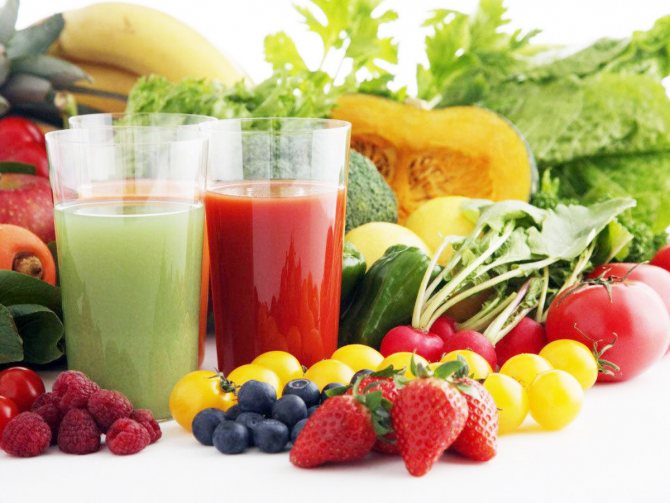
Boiling jam for several hours, boiling fruits and stewing vegetables for a long time means making them depleted and useless for the body. In just a quarter of an hour of this process, vitamin C is destroyed.
- Thiaminase - this component is capable of destroying vitamin B1. Long-term storage of valuable products, as well as excessive consumption of raw fish and eggs, as well as certain types of berries (cherries, currants, blueberries), Brussels sprouts will deplete the products. Thiaminase is also found in coffee, and therefore an extra cup can cause the destruction of thiamine.
Indications for taking vitamins
A deficiency of some or several substances at once will be indicated by various signs:
- The urine darkens and circles form under the eyes;
- There is a feeling of heaviness in the hypochondrium, on the right side;
- Excessive appearance of various stars and spots, acne and irritation on the skin;
- It is the integument that becomes a kind of indicator of an organ such as the liver. Often with liver diseases it becomes yellowish, gray, loses elasticity and a healthy shade;
- Constant sadness, bad mood and depressive states, which may also be accompanied by migraine headaches;
- The appearance of belching and nausea, a feeling of bitterness in the mouth;
- Decreased appetite for no reason.
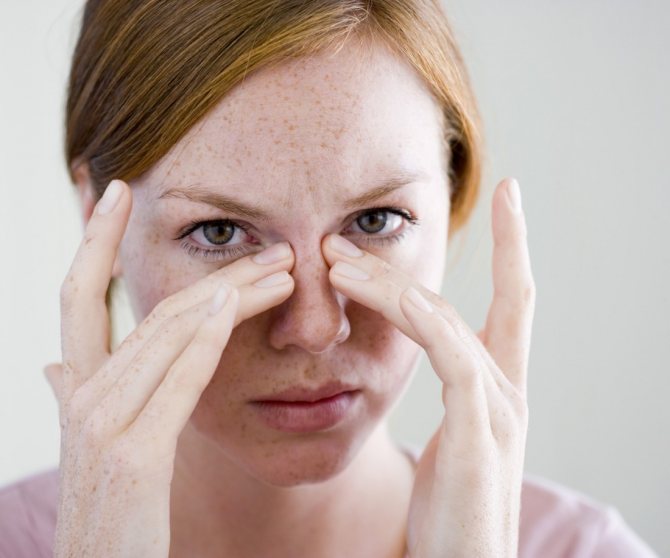
There are a number of signs that indicate a lack of a certain vitamin:
- A – in childhood, deficiency can cause slow growth of the child. In adults, a lack of vitamin A leads to impaired vision;
- K is a dangerous deficiency that affects the level of blood clotting. If your gums hurt, nosebleeds occur, you can talk about a lack of such a component;
- D is a vitamin that is necessary for the normal absorption of calcium. It is he who is responsible for strengthening bone tissue and teeth. Lack of vitamin D in childhood causes rickets;
- B2 – causes complications during pregnancy. A lack of such a substance can affect hair growth, often causing sparse hair. Sleep disturbance may also occur;
- B1 – a lack of such a substance leads to chronic fatigue, lack of physical strength for no apparent reason, and a decrease in the level of a person’s mental abilities.
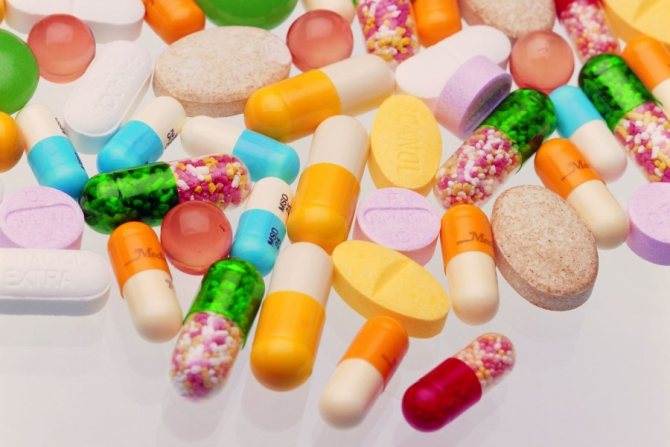
It is not so easy to determine the lack of other compounds by external signs, but this can always be done after a series of tests.
Elements important for the liver
Poor nutrition, diets and fasting, pregnancy, libations, bad habits - all this can lead to shortages of other components. Often the doctor decides not only which vitamins are best for the liver. He selects complexes that contain a number of important microelements. Among the most important are selenium and copper - these substances are the first to be washed away in liver diseases.
To compensate for the deficiency, you can choose special multivitamin complexes or choose medications in addition to vitamins.
Vitamin complexes
The decision to prescribe vitamins for the liver and the names of the drugs should be given by doctors after examining patients.
There are the most common drugs with a balanced and valuable composition for humans.
Contains not only microelements that are necessary for normal liver function. It contains vitamins in the required daily dose.
One of the leaders, often prescribed to patients for its valuable composition. Among the included vitamins are D3, A, E, C. B vitamins are also present. They are all necessary for the normal functioning of the organ.
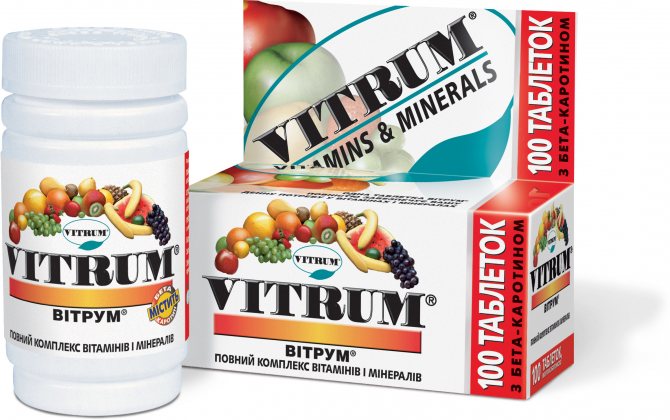
- Heparosis forte
This is a vitamin preparation that is recommended for use after suffering from hepatitis C. The phyto-set ensures normal liver function, it helps strengthen the immune system, since it contains valuable components necessary for the normal functioning of all organs and systems. A huge amount of vitamins and minerals is the basis of Heparose Forte.
You should take it according to the standard regimen as follows: 1 tablet/3 r. while eating.
A group of vitamins to normalize liver function. The drug is prescribed when there is a deficiency of valuable components; it allows you to compensate for their deficiency in the body.

Vitamin complex for normalizing liver function, 100 tablets in one bottle. The tube contains convenient capsules that contain components valuable for the liver, including calcium, vitamin B6, and zinc. The full composition of the product is presented in the annotation. The drug belongs to the group of dietary supplements; it is offered in pharmacy kiosks, as well as on specialized websites.
Works to restore liver health and function.
A balanced drug that includes only natural plant components, they are responsible for normalizing the functioning of the organ. The composition contains extracts of medicinal plants, including purslane, milk thistle, etc.
The substances used also include a valuable set of B vitamins. The standard dosage regimen involves consuming one tablet strictly before meals - 20 minutes. One tablet a day is enough to provide the liver with the necessary complex of vitamins.
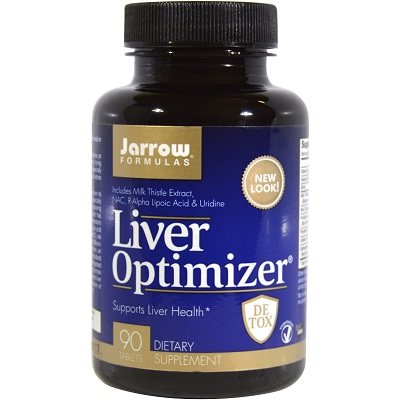
- Jarrow Formulas
One package contains only 90 tablets, they contain only natural extracts of plants valuable for the liver. The components contain vitamins and minerals. The effect of all components is invaluable for the liver and the whole body. The complex works to improve the functioning of the excretory system and allows the body to get rid of toxins. The tablets are taken according to the standard regimen: 3 times a day before meals.
The drug, used in medical practice, is prescribed by doctors for the treatment of various liver diseases. This is a biological supplement that should be consumed directly during meals, when it has the greatest effect, since it will be absorbed along with food.
The multicomplex, which improves metabolism and metabolic processes, is responsible for increasing blood circulation in tissues and organs. It is also used in medical practice to reduce the level of bad cholesterol and helps restore damaged liver tissue.
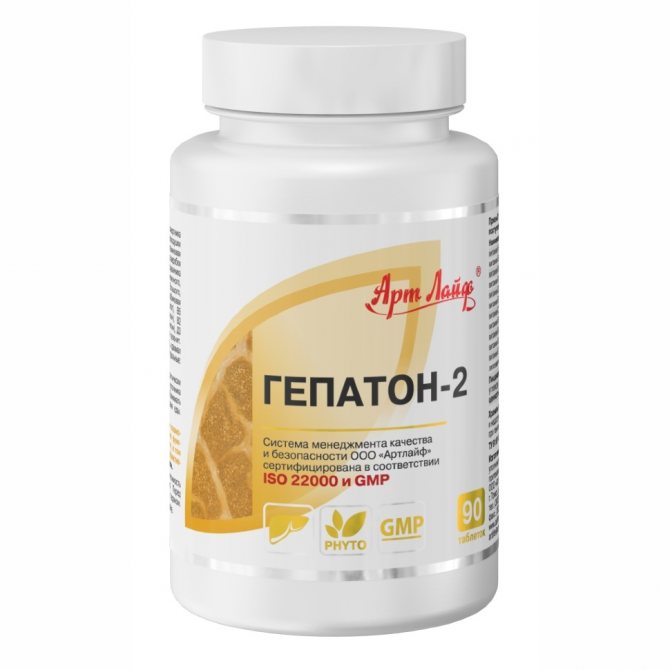
The drug contains B vitamins and microelements; they have a beneficial effect on the nervous system and other organs. Among the components used: extract of mint, beet and burdock, rose hips and tansy, St. John's wort. The product is rich in methionine, glutathione, and contains valuable L-glutamine.
Vitamins and minerals for the liver.
The liver is a sentry guarding the health of our entire body . But, like every sentry, it needs support and care. If the liver is no longer in ideal condition, then all the more it requires care and nourishment with everything necessary. First of all, vitamins.
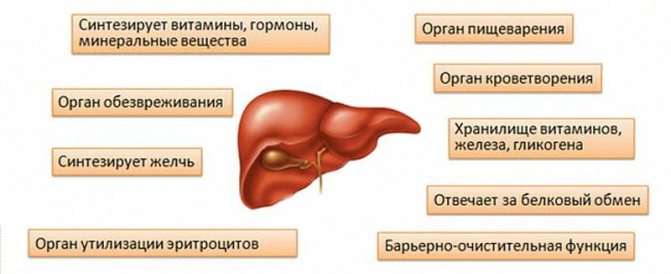
The most beneficial vitamins for the liver.
Doctors say that in this case the liver simply cannot do without vitamins such as E and C, as well as lipoic acid.
It is vitamin C that will help the body resist poisoning and thereby serve as a kind of armor for the liver. The most vitamin C is found in black currants, strawberries and rose hips. And also in all citrus fruits.
Vitamin E has another, but no less important function: to keep liver cells intact and safe. It prevents them from being destroyed and does not allow hormones to “bounce.” At the same time, it is responsible for the health of the immune system. You can find vitamin E in nuts and vegetable oil. Add sea buckthorn and blackberries to your menu. The most convenient and reliable way to get vitamins C and E in the quantities necessary for the body is to take them in the form of dietary supplements (dietary supplements).
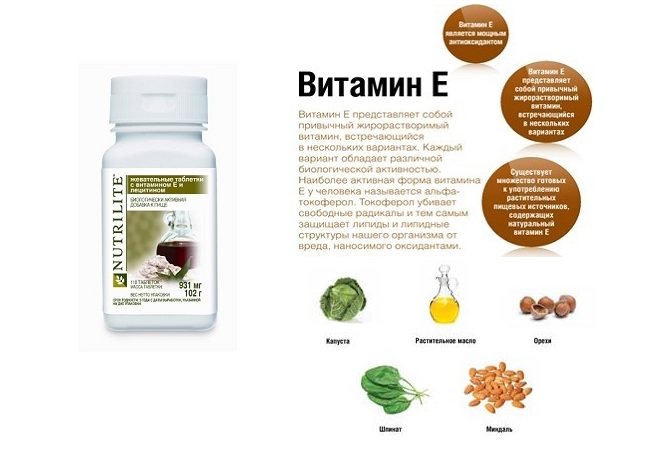
But lipoic acid normalizes the balance of fats and carbohydrates in the body and serves as a kind of doping for the liver, spurring it to perform its daily duties. Lipoic acid is found in many products, but if liver problems are already becoming obvious, then it is worth remembering that the acid is also contained in drugs produced by pharmacists. But in each such case, you should consult a doctor, since some of these medications can cause complications in other diseases.
The liver protects the body from the effects of all kinds of toxins , but at the same time it is possible to destroy its cells - hepatocytes. To restore them and enhance the detoxifying function, it is recommended to use hepatoprotectors . The list of such drugs includes agents that increase the activity of enzyme systems, improve metabolism, antihypoxants, etc.
Hepatoprotectors come from a variety of origins, including herbal ones . The preparations are made mainly from the fruits of milk thistle . This plant contains a large amount of a special substance - silymarin, which has a hepatoprotective effect. One of the best and safest hepatoprotectors of plant origin is the dietary supplement Liver Active , produced by Nutrilite.
5 GROUP B VITAMINS in NUTRILITE™ Liver active participate in metabolic processes in the liver, are responsible for activity and well-being, and are necessary for the functioning of the nervous and vascular system.
EXTRACTS OF SILK THISTLE, DANDELION AND TURMERIC have antioxidant and antiseptic properties and ensure normal liver functioning.
What foods will support the liver?
However, vitamins are vitamins, but you shouldn’t forget about minerals. These are also reliable liver assistants in its round-the-clock work. Oddly enough, she really needs zinc and selenium in order to resist the eternal vice of humanity - the love of drinking, and also in order to cope with the toxicity of the drugs that we sometimes have to use willy-nilly.
To replenish your zinc reserves, eat fish, meat and eggs more often.
But for selenium you should turn to foods such as nuts and seafood. Garlic and broccoli are from the same opera.
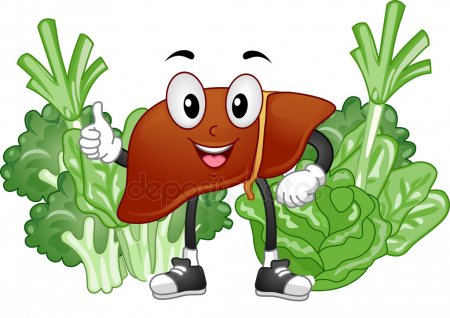
And finally, the last tips. About the benefits of proper nutrition for liver health.
First: don't overeat. It is not for nothing that yogis say: those who overeat are poisoned. Second: fasting is just as harmful to the liver. With food deficiency, the liver is deprived of the required amount of vitamins and microelements. As a result, its cells weaken and may even die. Third , especially for chocolate lovers. Limit this love because chocolate contains palm oil. And this is a very serious blow for the liver, which can lead to knockdown. And the last piece of advice: don’t eat heavily at night. The liver, like our entire body, also wants to rest. At night, the metabolic process slows down, and the liver becomes especially vulnerable.
Did you like the article? - Share with your friends. I will be grateful for your feedback and comments!
Subscribe to Blog updates so as not to miss useful information.

Healthy foods for the liver
To ensure normal functioning of the organ, it is important to include certain foods in the diet program:
- Sea kale is a product rich in iodine, selenium, and zinc. It is used not only to maintain liver health. The iodine it contains helps restore thyroid function. It is often included in a dietary nutrition program, as it promotes weight loss by stabilizing hormonal levels and cleansing the liver.
- Pumpkin is a seasonal product that becomes a valuable source of retinol, tocopherol, and vitamin C. Pumpkin is a common component of dietary programs because it allows you to remove fats from the body.
- Olive oil is a valuable component containing tocopherol. It is a natural antioxidant that allows the body to provide a high degree of protection against free radicals.
The program may also include yeast, which brings B vitamins to the body, sources of retinol - vegetables, fermented milk products rich in calcium and lactobacilli. They ensure the normal functioning of the digestive tract and have a beneficial effect on the condition of the liver.
source
What vitamins and minerals does the liver need?
Vitrum is considered the best choice.
Vitamin and mineral sets are included in many liver preparations as an auxiliary nutritional complex necessary to support cells and stimulate metabolism and eliminate toxins. Vitamin complexes for the liver must necessarily contain vitamins C, A and E, since they play the greatest role in the normal functioning of the organ, as well as elements of group B. It is recommended to take Vitrum, Berliton, Ascorutin and other combined preparations containing optimal and a balanced set of vitamins and minerals.
B vitamins
These substances have a direct effect on the condition of the liver, since they regulate the removal of bile, participate in protein synthesis and remove toxic products that accumulate in the organ through the blood. Vitamin B12, as an active participant in hematopoietic processes, is indicated for use not only for liver diseases, but also for leukemia and hemophilia. There are 6 representatives of the group:
| Name | Impact |
| Thiamine (B1) | Protein synthesis, participation in metabolism, cell nutrition |
| Riboflavin (B2) | Optimizing the outflow of bile and participating in its synthesis, strengthening capillary fibers, stimulating the work of the liver glands and intestines, protecting the mucous membranes of the organ |
| Niacin (B3) | Fighting cirrhosis by strengthening and regenerating liver cells, optimizing energy metabolism, protecting the organ from pathogens of inflammatory processes |
| Choline (B4) | Stimulation and normalization of intestinal function, elimination of toxic substances, breakdown and processing of fats in the liver |
| Pyridoxine (B6) | Stimulation of the absorption of fats and proteins, participation in their synthesis, breakdown of amino acids, promoting the outflow of bile |
| Cyanocobalamin (B12) | Hematopoietic |
Ascorbic acid
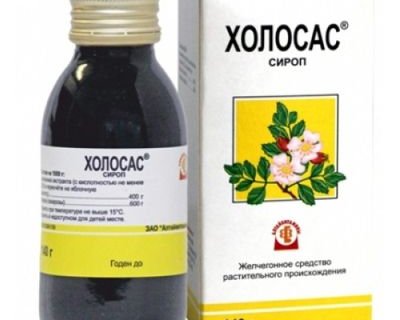
An integral participant in carbohydrate metabolism is vitamin C. Its beneficial properties for the liver are not limited to the regulation of carbohydrate-fat balance, it perfectly resists the penetration of toxins and is an excellent antioxidant. “Ascorbic acid” helps protect the body from pathogens of inflammatory processes and increases tissue tone. Many antiviral medications contain vitamin C as an immunomodulatory supplement. In order for it to enter the body and liver cells naturally, it is advised to eat more berries - raspberries, blueberries, black currants, as well as citrus fruits and drink rosehip decoction or use a special syrup extract "Holosas".
Tocopherol
Vitamin E acts as an excellent antioxidant and protects the liver from negative external influences - inflammatory and viral processes. Tocopherol slows down cellular aging by activating the endocrine system and increasing the stability of red blood cells. A lack of vitamin E leads to magnesium starvation of tissues and serves as an impetus for the development of oncology. The element must be taken for gallstone and liver diseases. Decoctions of rowan, sea buckthorn, rose hips and cherries are used as a natural source of ticopherol; large amounts of the vitamin are found in eggs, legumes, almonds, and peanuts.
Lipoic acid or vitamin N
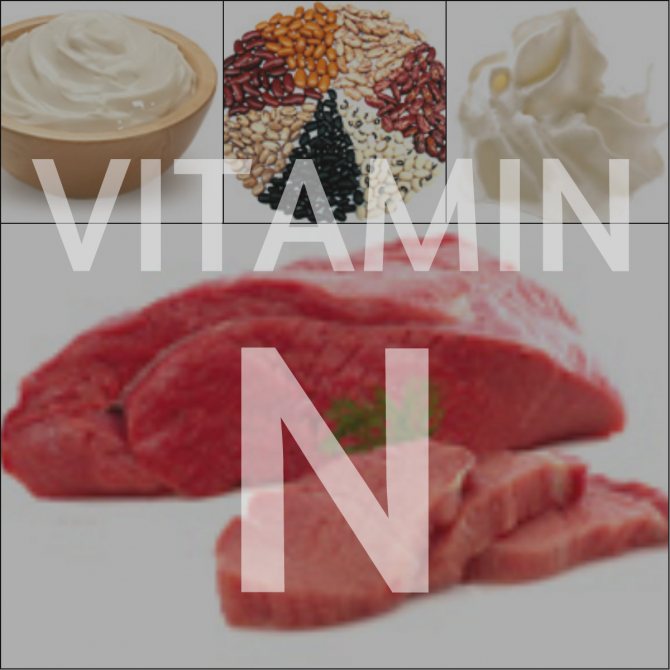
This element is the main regulator of carbohydrate-fat balance and takes an active part in the process of decomposition and elimination of toxic substances. Thiocotic (lipolyic) acid can be sold as a separate dietary supplement in capsules or included in a complex that contains other vitamins. In order for more of the element to enter the body naturally, it is recommended to enrich the diet with beef by-products, mushrooms, legumes, and herbs. Eat more cereals - rice, wheat, add flaxseed to salads.
Macro- and microelements
There is no clear answer as to which microelement is the most important for the liver. To support the organ, a complex consisting of Na, Ka, Mg and other chemical elements involved in cellular processes and blood circulation is needed. The most important liver protector against the negative effects of alcohol and toxins contained in pharmaceuticals is selenium (Se). The daily norm for a patient with cirrhosis or hepatitis reaches 100 mg; for a healthy person, 30 mg is enough to prevent liver diseases.
What medications can damage the liver? 7 drugs that negatively affect the liver.
The liver is considered the main laboratory of our body - it has the main detoxification function. If we talk about its importance as an organ, then with complete liver failure, a person can live no more than 2-3 hours, after which irreversible intoxication will begin.
Blood flows through the liver, coming directly from the digestive tract. In this case, the primary “disinfection” of toxins that come to us with food occurs.
Medicines we take orally pass through the same route. Therefore, there are medicinal forms (rectal, sublingual, intravenous and intramuscular) that help deliver drugs bypassing the liver.
The liver is the first line of defense against toxins entering the body: it removes them from the bloodstream before they can reach other organs.
However, the detoxification process does not always take place without consequences for the liver itself - many chemicals destroy hepatocytes, leading to a chronic inflammatory process.
How do medications damage the liver?
Medicines are substances that are completely alien to our body, most of them of synthetic origin. The liver perceives these chemical components as toxins, trying to inactivate and neutralize them as quickly as possible.
But there are a number of drugs that, when inactivated, damage the liver, rendering it inoperable for a long time. There are special recommendations on how exactly to use such drugs, at what time of day it is best to take them, and how to combine them with other medications to reduce the load on the liver and avoid damage to it.
Let's look at some drugs that can damage the liver.
Antibiotics
This is the most common group of drugs that have a negative effect on the liver. Antibiotics are prescribed for infectious pathologies, but recently this is often done unjustifiably, even for ARVI and colds (which are viral diseases). Most often, antibiotics are prescribed in short courses, during which time they cannot cause significant harm to the liver.
NSAIDs are non-steroidal anti-inflammatory drugs.
This group includes a huge number of drugs, the most famous of which are paracetamol, aspirin, analgin, diclofenac and indomethacin. They are often prescribed to relieve pain, sometimes for quite a long period of time. For some rheumatological diseases, you have to take NSAIDs for months or even years. Moreover, they have a fairly pronounced toxic effect on the liver.
Anticonvulsants.
Unfortunately, these medications are also prescribed for a long period of time (sometimes for life). Most often they are prescribed for epilepsy, but can be used in the treatment of seizures of any origin and pain syndrome (for example, trigeminal neuritis).
Anti-tuberculosis drugs.
It would be more correct to classify them as antibiotics, but there are a number of differences. Basically, these are broad-spectrum antibacterial drugs; they are taken for at least 6 months (for mild forms of tuberculosis).
The course of treatment can last several years, and in some cases be repeated. Needless to say, how much the liver suffers in this case.
Statins.
This is a very important group, which is prescribed to lower cholesterol levels and normalize lipid metabolism. Appointed for a long term. To avoid liver damage, it is important to choose the optimal dosage, constantly monitor the condition of the liver - do an ultrasound every 3 months and donate blood for enzymes (ALT, AST) every month.
You may say that it is easier not to drink them at all. But a high risk of cholesterol is a direct threat to human life, a high risk of complications (stroke and myocardial infarction). Therefore, it is more important to strictly follow the instructions and monitor the condition of the liver.
Vitamin A
You probably didn’t expect to see vitamins on this hit list. But I want to talk not about the vitamin itself, which comes into our diet with food, but about the numerous dietary supplements and multivitamin complexes that we often prescribe to ourselves with or without reason, significantly exceeding the daily requirement and without controlling the dose.
Many people treat skin diseases with vitamin A - ask anyone with problem skin what vitamin they take most often, and they will say without hesitation that it is Aevit. But this is a full-fledged drug that, if used incorrectly, can cause serious harm to the liver.
